Complete Solutions to EXAMPLE of chapter ELECTROMAGNETISM of Class 12 book with complete answers and questions
| Class 12 | PHYSICS |
| Chapter | ELECTROMAGNETISM |
| CHHAYA PRAKASHINI | EXAMPLE |
| Number Of Questions | 45 |
| Academic Year | 2023-24 |
The distance between two long straight conductors is 5m. Currents `2.5A` and 5A are flowing through them in the same direction. What will be the magnetic field at the mid-point betwen them ?
View Solution5 A current is flowing is mutually opposite directions through each of two parallel straight conducting wires kept `0.2` m apart (fig1.21). Determine the magnitudes and directions of magnetic field at the points P,Q and R lying on the plane containing the two wires.
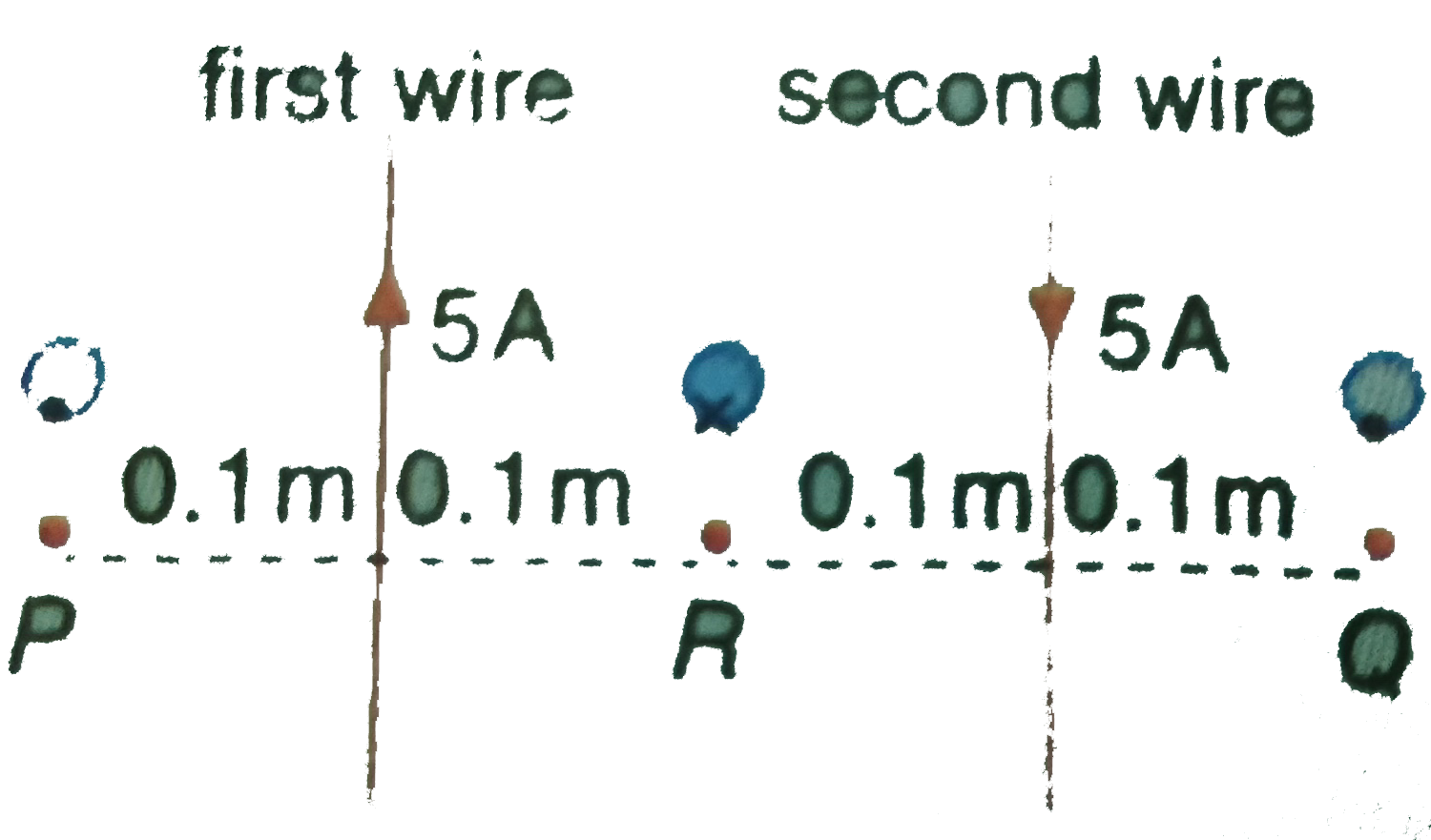
View SolutionAn infinitely long conducting wire POQ is bent through right angles at O (Fi,g 1.22]. If a current I is sent through this bent wire, what will be the magnitude of the magnitude of the magnetic field at the point A at a distance r from each part of the wire ?
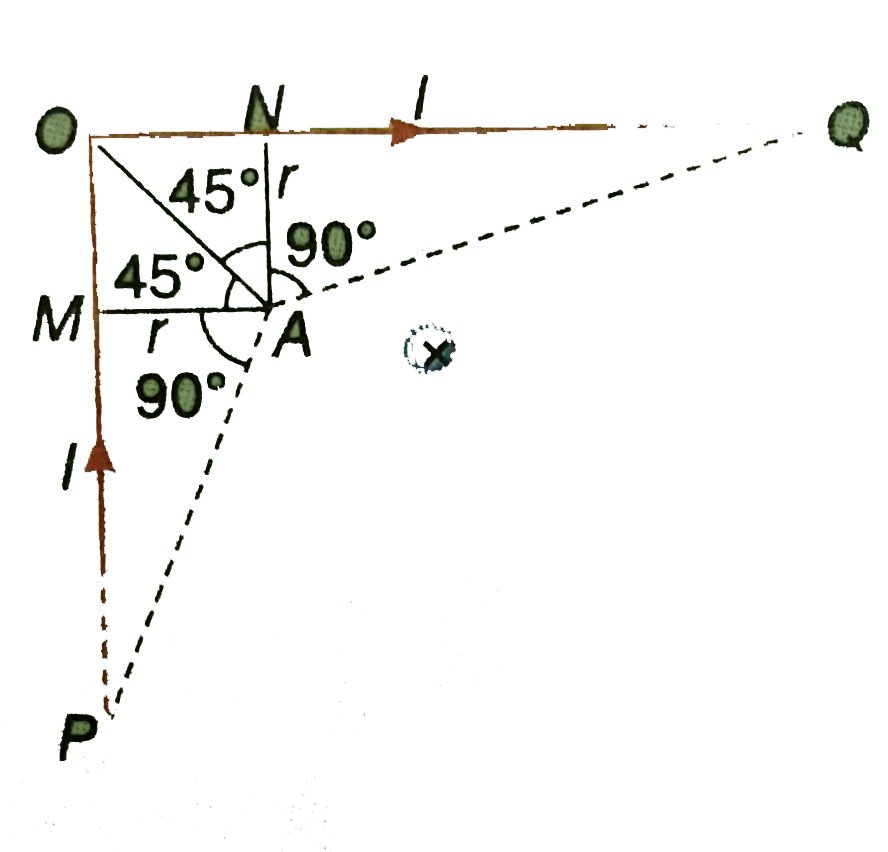
View Solution5 A current is flowing through a long straight conducting wire. What is the magnitude of magnetic field at a distance 10 cm from the wire ?
View SolutionThe radii of two concentric circular coils are 8 cm and 10 cm and the number of turns in them are 40 and 10, respectively. A 5A current is passing through each of them In the direction. Determine the magnetic field produced at the centre of the two coils.
View SolutionA current I is flowing through an infinitely long wire PQRS [Fig. 1.30]. The wire is bent at right angles so that the part QR becomes one-fourth of the circumference of a circle or radius r whose centre is at O. Determine the magnetic field at O.

View SolutionDetermine the magnetic field at the point O due to the circuit shown in Fig.1.31.
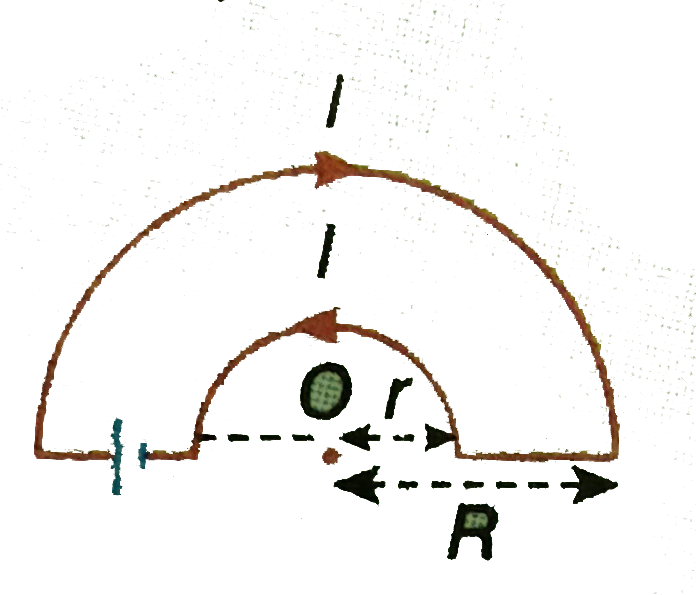
View SolutionWhat is the magnetic field produced at the centre of a hydrogen atom due to revolution of its electron in the first order (K-orbit).
Radius of the first orbit `=0.53xx10^(-10)m`, velocity of electron in that orbit `=2.19xx10^(6) m*s^(-1)`.
View SolutionCalculate the magnetic induction at point O( centre of the partial circular conductor) show in the figure.
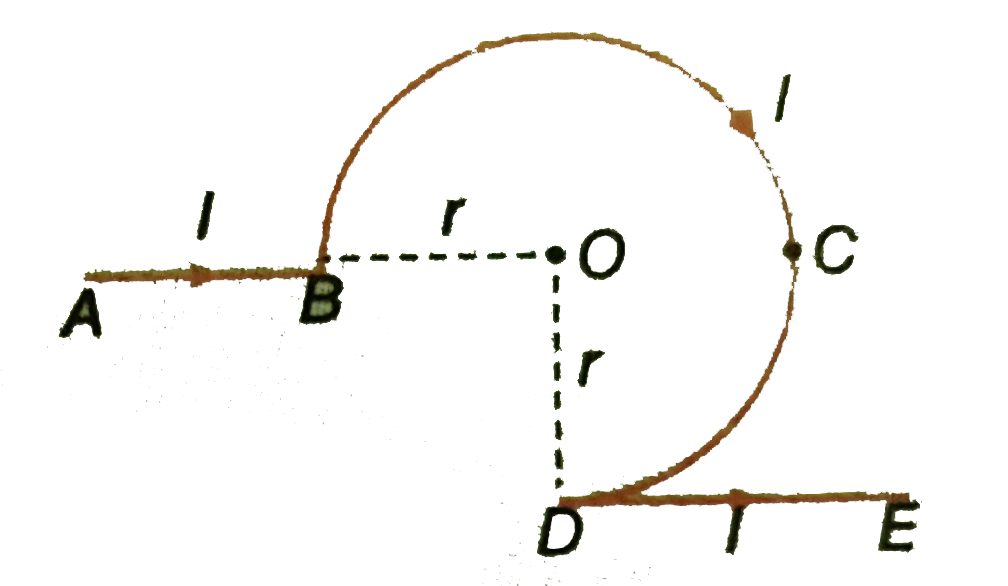
View SolutionTwo concentric but mutually perpendicular conduction coils are carrying current 3A and 4A, respectively . if the radius of each coil be `2pi,cm`. What will be the magnetic induction at the centre of the coils ?
`(mu_(0)=4pixx10^(-7)Wb*A^(-1)m^(-1))`.
View SolutionEach of the long straight, wires, passing through the points A and B of Fig. 1.33, carries a current I directed vertically upwards with respect to the plane of the paper. The separation between them is r. find out magnetic field at a point P on that plane, which is at a distance r from each of the wires.
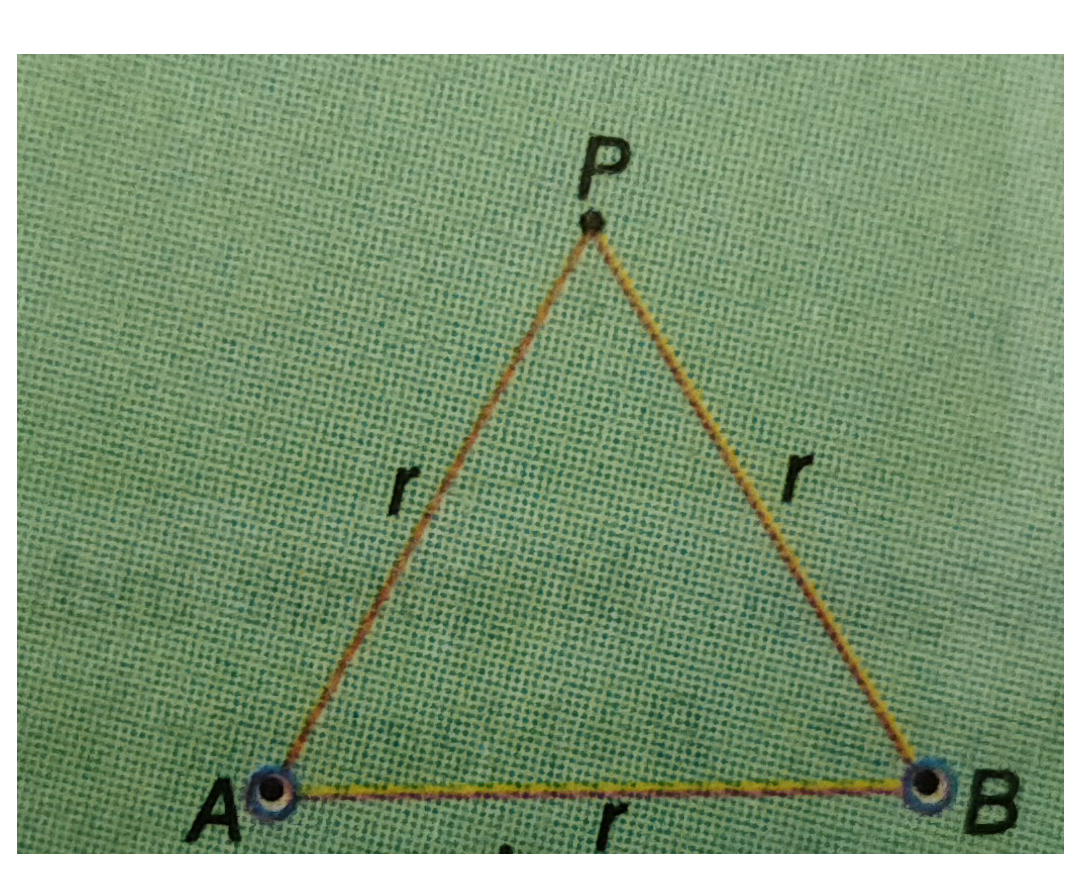
View SolutionTwo small identical circular loops marked (1) and (2) carrying equal currents, are placed with their gometrical axes perpendicular to each other as shown in figure. Find the magnitude and direction of the net magnetic field produced at O. Also determine the field when radius of the loop is very large as compared to the distance of the point from centre.
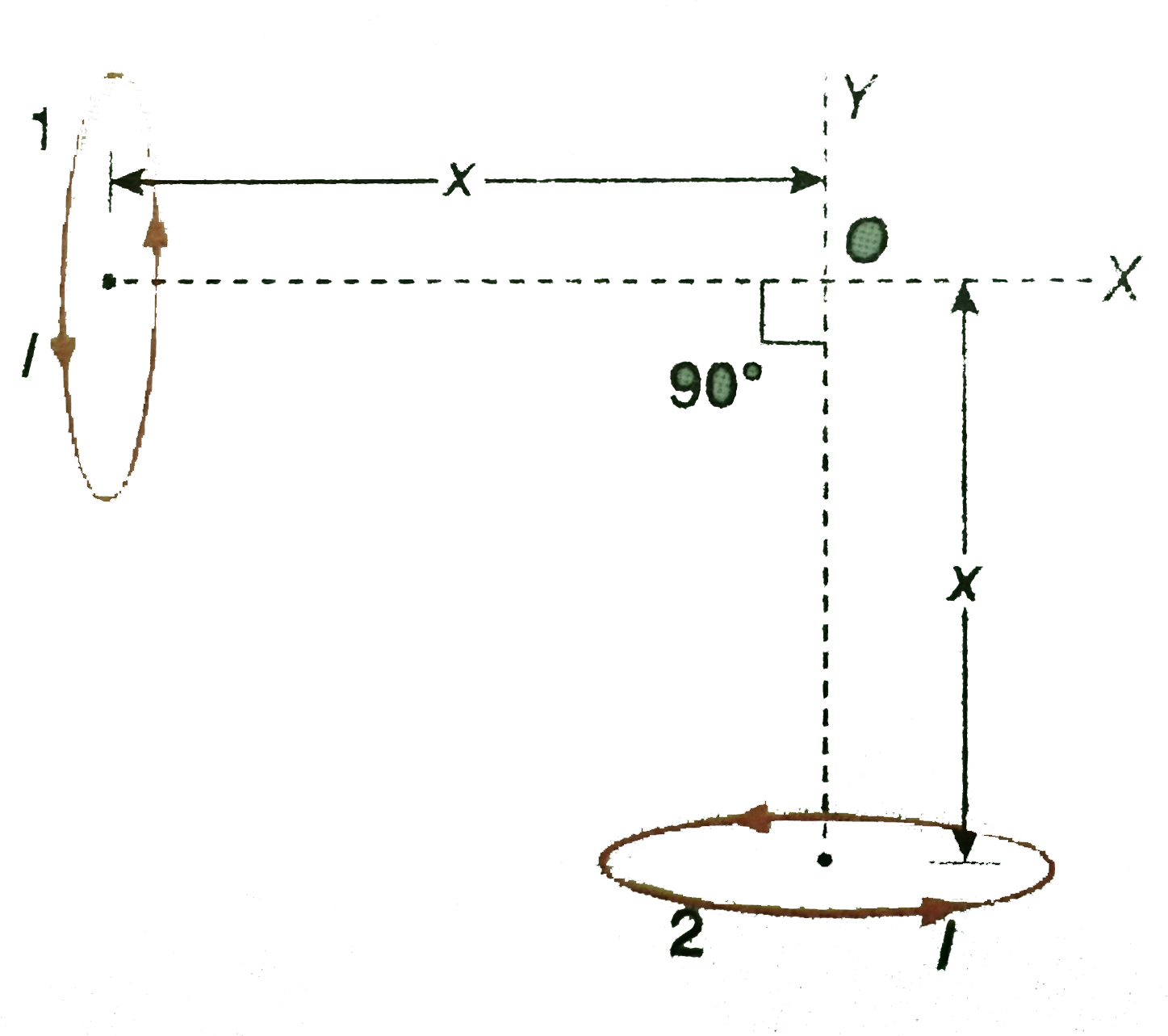
View SolutionTwo circular coils of radii a and 2a having a common centre, carry identical current I but in opposite directions. Number of turns of the second conductor is 8. show that magnetic field intensity at the centre is 3 times that due to the smaller one. Also find out the change in the previous when current flow in the same direction through both the coils.
View SolutionA wire loop is formed by joining two semicircular wires or radii `r_(1) and r_(2)` as shown in the figure. If the loop caries a current, I, find the magnetic field at the centre O.
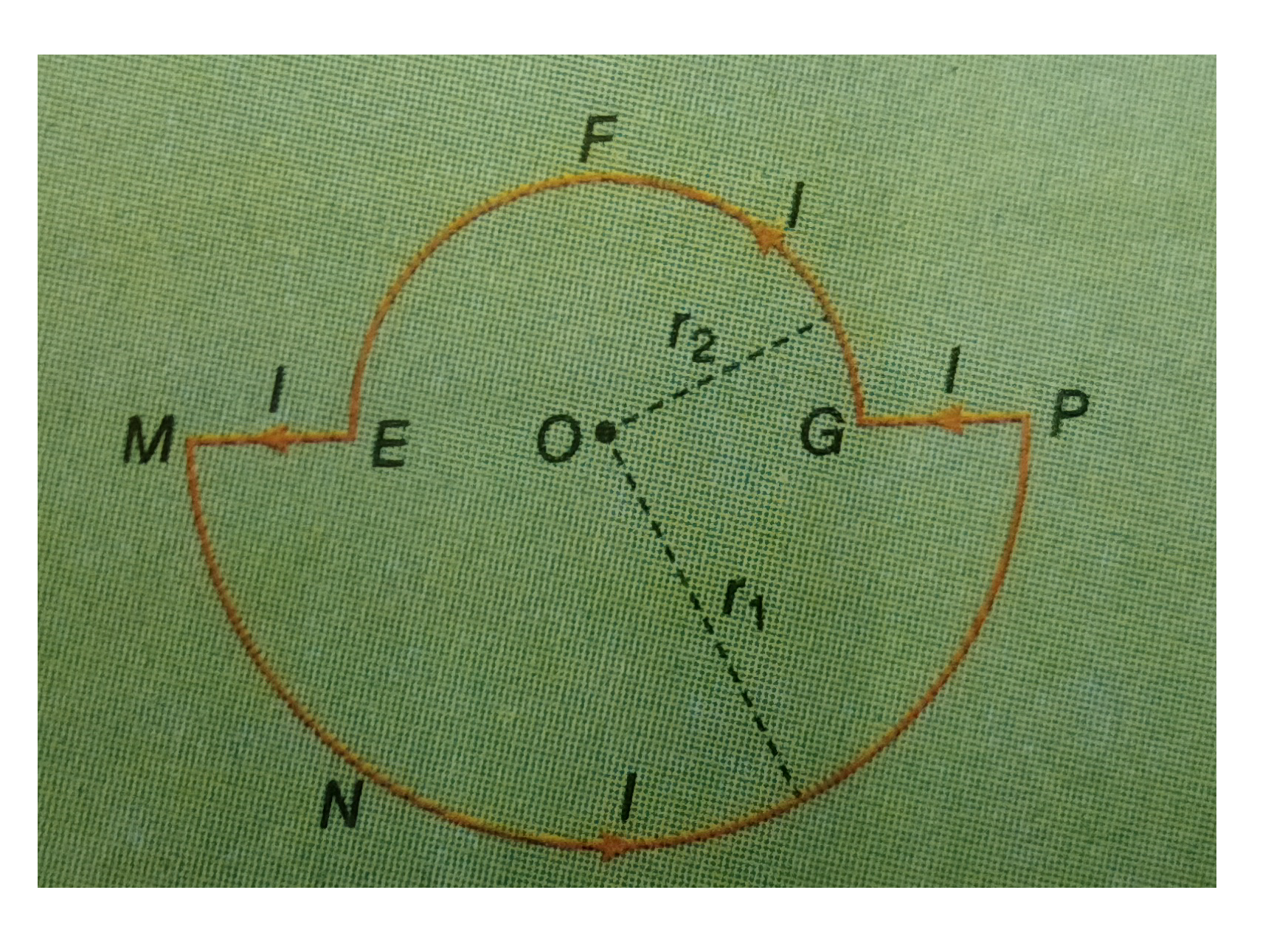
View SolutionRadius and number of turns of a circular coil are 10 cm and 25 respectively. What should be the curcrent through the coil that will produce a magnetic field of `6.28xx10^(-5)Wb*m^(-2)` at its centre ?
View SolutionThe magnetic field due to a current carrying circular loop of radius 3 cm at a point on the axis at a distance of 4 cm from the centre is `54muT`. What will be its value at the centre of the loop ?
View SolutionA solenoid with 7 turns per unit length is carrying a current of `2.5A`. What is the magnetic intensity inside the solenoid ?
View SolutionLength of a solenoid is 50 cm and its total number of turns is 1250. if 2A current is a passed through it, what will be the magnetic field at any point on its axis ?
View SolutionTwo solenoids made of insulated conducting wires and of equal lengths are such that one is wound over another. Resistance of each of them is R and number of turns per unit lenghts is n. The solenoids are now conected in series and if current flows through them in the same direction in both cases, determine the magnetic field along the axis of solenoids in each case.
View SolutionTwo solenoids made of insulated conducting wires and of equal lengths are such that one is wound over another. Resistance of each of them is R and number of turns per unit lenghts is n. The solenoids are now connected in parallel and the combination is then connected with a battery of emf E. if current flows through them in the same direction in both cases, determine the magnetic field along the axis of solenoids in each case.
View SolutionA long straight solid conductor of radius 5 cm carries a current of 2A, which is uniformly distributed over its circular cross section. Find the magnetic field at a distance of 3 cm from the axis of the conductor.
View SolutionA magnetic field of `0.40T` is applied on a proton moving with a velocity of `5xx10^(6) m*s^(-1)`. The magnetic field acts at a angle `30^(@)` with the direction of velocity of the proton. What will be the acceleration of the proton ? ( mass of proton `=1.6xx10^(27)kg)`.
View SolutionAn electron (mass `=9xx10^(-31)kg`, charge= `1.6xx10^(-19)C)` enters a magnetic field with velocity `10^(6)m*s^(-1)` and starts rotating in a circular path of radius 10 cm. What is the magnetic field ?
View SolutionTwo particles of equal charge are accelerated by applying the same potential difference and them allowed to enter a uniform magnetic field normally. If the particles keep revolving along circular path of radii `R_(1) and R_(2)`, determine the ratio of their masses.
View SolutionIn a cyclotron the frequency of alternating current is 12 MHz and the radii of its dee is `0.53m`. What should be the operating magnetic field to accelerate protons ? Given mass of proton `=1.67xx10^(-27)` kg and charge `=+1.6xx10^(-19)C`.
View SolutionIn a cyclotron the frequency of alternating current is 12 MHz and the radii of its dee is `0.53m`. What is the kinetic energy of the proton beam produced by the cyclotron ? Given mass of proton `=1.67xx10^(-27)` kg and charge `=+1.6xx10^(-19)C`.
View SolutionA beam of proton with velocity `4xx10^(5)m*s^(-1)` centres a uniform magnetic field of `0.4T` at an angle of `60^(@)` to the magnetic field. Find the radius of the helical path of the proton beam and the time period of revolution. Also find the pitch of helix. Mass of proton `=1.67xx10^(-27)kg`.
View Solution2A current is flowing through a circular coil of radius 10 cm, made of insulated wire and having 100 turns.
If the circular plane of the conductor is kept at right angles to the direction of a magnetic field of `0.2Wb.m^(-2)`, determine the force acting on the coil.
View Solution2A current is flowing through a circular coil of radius 10 cm, made of insulated wire and having 100 turns. If the conductor is palced parallel to the magnetic field, determine the torque acting on it.(magnetic field=0.2T)
View SolutionThe radius of a circular coil having 100 turns is 5 cm and a current of `0.5A` is flowing through this coil. If it is placed in a uniform magnetic field of stregth `0.001` T, then what torque will act on the coil, when the plane of the coil is parallel to the magnetic field,
View SolutionThe radius of a circular coil having 100 turns is 5 cm and a current of `0.5A` is flowing through this coil. If it is placed in a uniform magnetic field of stregth `0.001` T, then what torque will act on the coil, when the plane of the coil is inclined at `30^(@)` with the magnetic field,
View SolutionThe radius of a circular coil having 100 turns is 5 cm and a current of `0.5A` is flowing through this coil. If it is placed in a uniform magnetic field of stregth `0.001` T, then what torque will act on the coil, when the plane of the coil is perpendicular to the magnetic field ?
View SolutionOn a smooth plane inclined at `30^(@)` with the horizontal, a thin current carrying metallic rod is placed parallel to the horizontal ground. The plane is in a uniform magnetic field of `0.15T` alon the vertical direction. For what value of current can the rod remain stationary ? the mass per unit lenght of the rod is `0.30`kg/m.
View SolutionTwo very long conducting wire are kept at a distance 4 cm from each other in vacuum. Currents flowing through the wires are 25A and 5A, respectively. Find the length of each conductor, which experiences a force of 125 dynes ?
View SolutionTwo long striaght parallel conducting wires, kept `0.5 ` apart, carry 1A and 3A currents, respectively [Fig. 1.73].
What is the force acting per unit length of the two wires ?
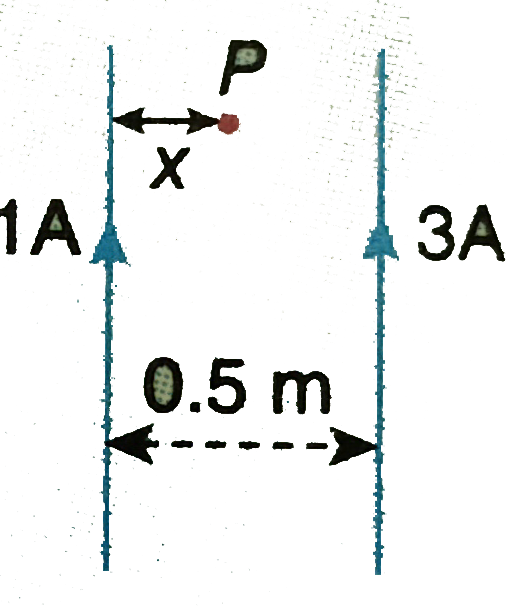
View SolutionTwo long striaght parallel conducting wires, kept `0.5 ` apart, carry 1A and 3A currents, respectively [Fig. 1.73].
At what position in the plane of the wires, the resultant magnetic field will be zeron ?
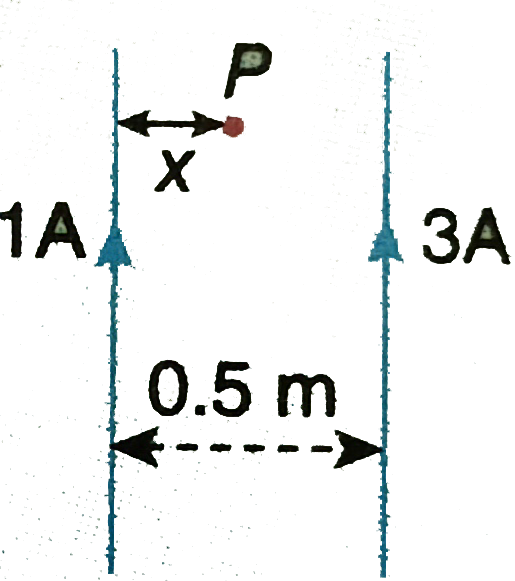
View SolutionTwo long parallel conductors, kept at a dsitance d, carry currents `I_(1) and I_(2)` respectively. The mutual force acting between them is F. now the current in one is doubled and its direction is also reversed. If the distance of seperation between them is made 3d, what will be the force acting between the two conductors ?
View SolutionA long horizontal wire AB, which is free to move in a vertical plane and carries a steady current of 20 A, is in equilibirum at a height of `0.01` m over another parallel long wire CD, which is fixed in a horizontal plane and carries a steady current of 30 A as shown in figure. Show that when AB is slightly depressed, it executes simple harmonic motion. Find its period of oscillations.
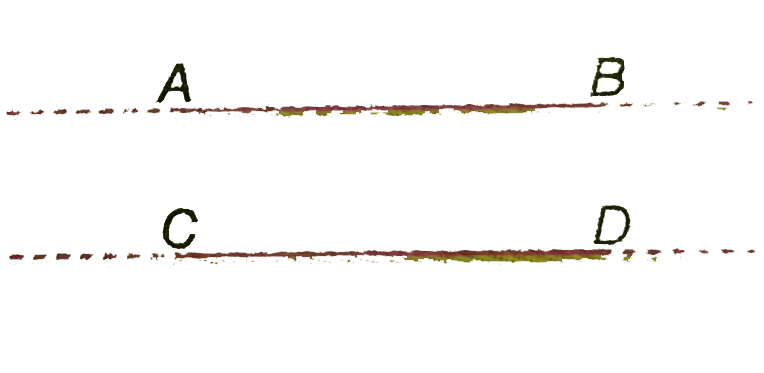
View SolutionA galvanometer of resistance `10 Omega` gives full scale deflection for current of 10 mA. How can this galvanometer be used as an ammeter of merasure current of range `0-2A`
View SolutionA galvanometer of resistance `10 Omega` gives full scale deflection for current of 10 mA. How can this galvanometer be used as a voltmeter having volage range `0-5V` ?
View SolutionFull-scale deflection occurs in a moving coil galavanometer of resistance `36 Omega` when 100 mA current flows through it. What arrangement should be done to convet it into a voltmeter of `0-5V` range ? Draw the ncessary circuit diagram.
View SolutionA millivoltmeter of range `0-50` mV and resistance `50Omega` is to be converted into an ammeter of range `0-1A`. How much it be done ?
View SolutionHow would you convert a voltmeter that can measure up to 150 V to an ammeter which can measure current up to 8A ? Resistance of the voltmeter is `300Omega.`
View SolutionA galvanomter of resistance `100 Omega` gives full scale deflection for a current of 10 mA. What is the value of the shunt to be used to convert it into an ammeter which can measure current up to 10A ?
View SolutionA moving coil galvanometer of resistance `50 Omega` gives full scale deflection for a current of 50 mA. How can this galvanometer be used to convert it into a voltmeter which can measure voltage upto 200 V ?
View Solution
EXAMPLE questions and complete solutions for chapter ELECTROMAGNETISM of CHHAYA PHYSICS (BENGALI ENGLISH) of Class 12
All Exercises from CHHAYA PRAKASHINI Class 12 PHYSICS ELECTROMAGNETISM
- AIPMT
- CBSE SCANNER
- ENTRANCE CORNER
- EXAMINATION ARCHIVE
- EXAMINATION ARCHIVE (WBJEE)
- EXAMPLE
- EXERCISE
- HIGHER ORDER THINKING SKILL (HOTS) QUESTIONS
- HOTS NUMERICAL PROBLEMS
- INTEGER ANSWER TPYE
- JEE MAIN
- MULTIPLE CORRECT ANSWERS TYPE
- NCERT EXAMPLAR QUESTIONS WITH ANSWER HINT (MCQ-1)
- NCERT EXAMPLAR QUESTIONS WITH ANSWER HINT (MCQ-2)
- NCERT TEXTBOOK QUESTIONS WITH ANSWER HINT
- NEET
- PROBLEM SET-I
- PROBLEM SET-II
- SECTION RELATED QUESTIONS
- SHORT ANSWER TYPE QUESTIONS-I
- SHORT ANSWER TYPE QUESTIONS-II